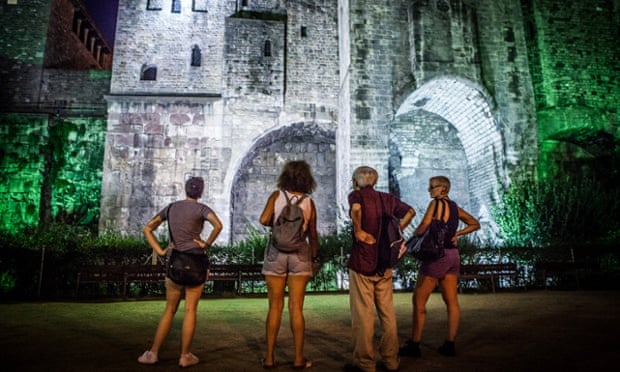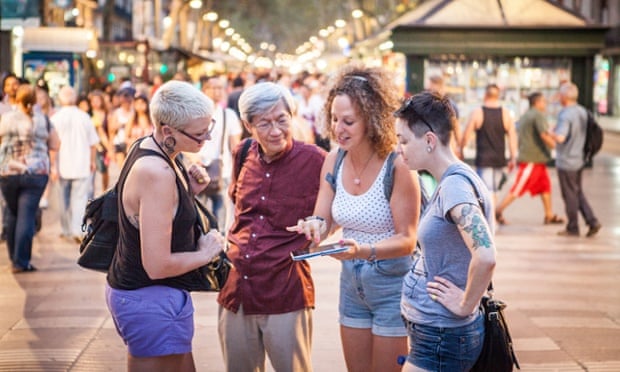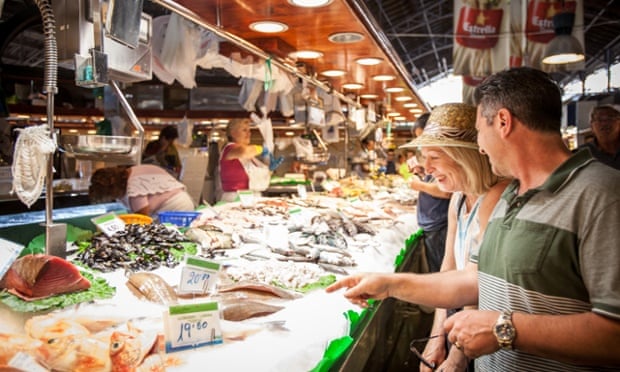This post may contain affiliate links. We may earn money or products from the highlighted keywords or companies or banners mentioned in this post.
The square outside the Sagrada Família is thronged with tourist groups basking in the warmth of the October afternoon. I, too, am part of a group, but there’s a difference. There are just two of us – myself and my 80-year-old mother – and our guide, a young Catalan called Eloi, who works for trip4real, an innovative company offering bespoke experiences for travellers who want to move beyond the herd.
Eloi makes a speciality of little-known facts (did you know that Antoni Gaudí’s fiancee became a nun, or that the great man was buried under the altar of the neo-Gothic chapel attached to the Sagrada Familía?). Last year, 3.1 million people visited the Catalan architect’s unfinished masterpiece, says Eloi. As we admire the soaring facade, he keeps up a steady stream of lively anecdotes, in idiomatic English. “See the guy there, leaning over the Virgin? That’s the Angel Gabriel, and what he’s saying is, ‘Y’know, Maria darling, this may be a shock to you, but somehow you’re gonna have a baby.’”
Mass tourism in the 21st century is close to killing the thing it loves, and cities like Venice and Barcelona are reaching saturation point. Meanwhile, the notion of “experiential travel”, offering a new sense of immediacy and authenticity, is gaining ground.
Trip4real, which was founded in Barcelona last year and is bankrolled in part by influential Catalan chef Ferran Adrià, is already becoming well established in Spain, and plans to extend its reach to London by 1 January.
The guides, or “locals”, sign up, create and validate their profile with social media, plan their activity, and set the price; Trip4real then vets it for authenticity. Like eBay sellers or Airbnb hosts, the community self-regulates via reviews and ratings, but the site also secret-shops its guides and reserves the right to blacklist (though it says this has never happened yet).

Eloi Morte was a flight attendant who was forced to give up flying for health reasons, so he returned to his home town and set about studying the architecture of Catalan modernism – as practised by Puig i Cadafalch, Domènech i Muntaner and Antoni Gaudí. A year after joining Trip4real, Eloi’s modernisme tours are among the top-rated activities on the site.
“There are people who want to talk about politics, or they want tips on restaurants and tapas bars. I only do small groups, and always give people my email and phone number,” he says.
Trip4real has more than a thousand locals in Barcelona, and a series of blue-chip backers, such as Adrià, La Caixa bank and trendy Spanish ad agency SCPF. As of last summer it also boasts a link-up with Airbnb – those who make a booking on the accommodation website receive a follow-up email from Trip4real. Hitherto confined to Spanish cities, the company is poised to expand into Lisbon, Rome, Paris and the Netherlands, after launching in London next month.
I meet Gloria Molins, the 31-year-old founder of the site, for a beer in Bar Mut, in the Calle Pau Claris. Molins, also one of the local guides, tells me her start-up was conceived during a couch-surfing tour of south-east Asia in 2012. One night in Cambodia she had an epiphany: “Whenever I’d ever had a wow moment on a trip, it had been thanks to some kind of contact with a local person.”
Before long, Molins was heading back to recession-ravaged Spain with a domain name, Trip4real.com. Last year, keen to recruit the backing of a famous local name, Molins secured a meeting with Ferran Adrià, a personal hero of hers. The chef now says he barely knew what a start-up was at the time, but was struck by the idea that a new generation of micro-entrepreneurs might help to pull the Spanish economy out of its deep crisis.
“I know what it’s like to arrive somewhere and say, ‘My goodness, I would really love to fully experience this city!’” Adrià said. “Trip4real is a project that, apart from being creative, different and run by people from here, might be opening a path towards a social dimension too.”

Guides earn, on average, €30-40 per trip (at a cost usually of €15-40 per tourist), and Molins claims her locals can make between €400–700 a month.
Since launching the site in February 2013, Molins has seen it grow from a shoestring operation in her flat to a business with eight employees and an investment pot of €1m. It is now Spain’s premier peer-to-peer experiential travel website, with 10,000 users in 50 cities and 2,500 activities, from jet-skiing to mushroom-picking, to a night on the tiles with a local DJ.
The variety is impressive. There is a tour of Barcelona’s exclusive boutiques with a shopper who knows the city’s high-end retail universe intimately. There is a fishing tour and a farming tour, a percussion workshop and an anarchist walkabout. I liked the sound of the jazz concert at a private house. The guides are mostly freelance (though some are professional) and the only common denominator is their “local resident” status and passion for their subject – be it cannabis grow shops, modernista architecture, or the highways and byways of Catalan cuisine. Given the city’s stellar gastronomic reputation, it’s no surprise that the foodie is well catered for.
Later in the morning, my mum and I pitch up for our second activity of the day – a market visit and Catalan lunch with Barcelona-born lawyer, chef and hardcore foodie, Sonia Blasco.
We dive into the Boqueria market just off La Rambla, where the shuffling tourists are three deep between the stalls. But Sonia knows the score, guiding us swiftly into the heart of a market where, she says, she shops on a regular basis. We are introduced to Rosa Mari at Alimentació Fores, from whom she buys her cheese.
Sonia’s crash course in Spanish food culture pushes all the right buttons of seasonality and tradition. Enthusiastic, and a born communicator, she is as happy explaining the difference between serrano and Parma ham or between a boqueron and a salted anchovy as she is expounding the rights of the Catalan people to hold their own independence referendum. In the shellfish section, a box of percebes (goose barnacles) sends her into raptures.
“They taste like a piece of ocean!” she says. “Why are they so expensive? Because women in Galicia climb the rocks to catch them.”

At a turron shop outside the market, our local remembers fondly how her entire family used to come down here to stock up on this tooth-challenging Spanish sweet in time for Christmas.
The tour concludes with a sensational lunch at the Bar del Pla, featuring some of the best chicken and mushroom-stuffed canelons I’ve ever tasted.
“This is a typical Catalan dish – my mother used to make it,” said Sonia. “See? I don’t just show you Barcelona – I show you my home.”
Powered by WPeMatico











